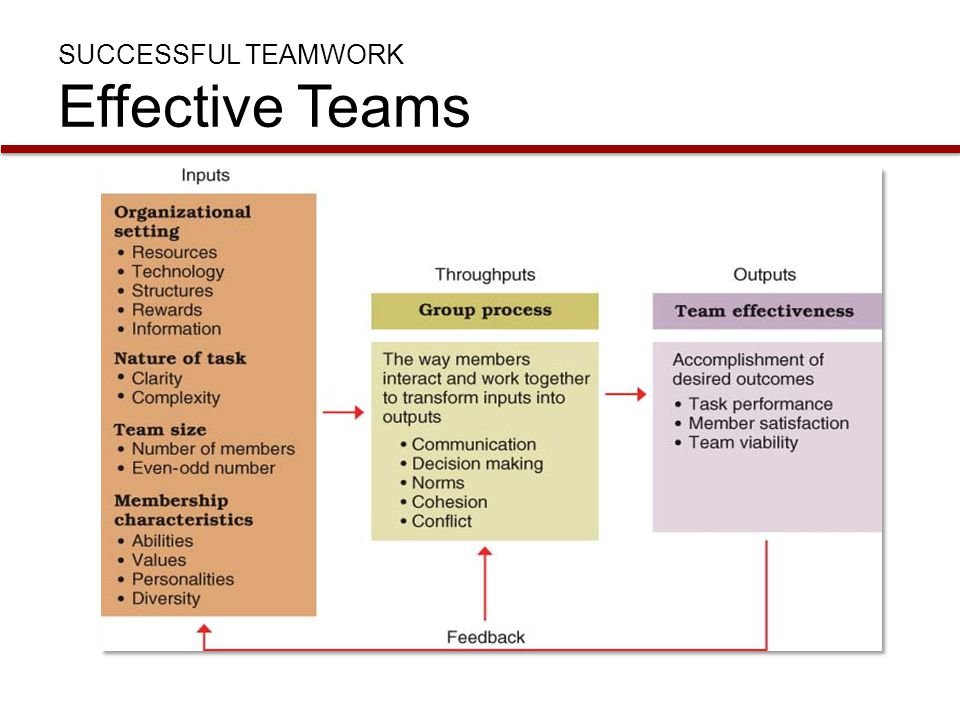Team effectiveness (also referred to as group effectiveness) is the capacity a team has to accomplish the goals or objectives administered by an authorized personnel or the organization. A team is a collection of individuals who are interdependent in their tasks, share responsibility for outcomes, and view themselves as a unit embedded in an institutional or organizational system which operates within the established boundaries of that system. Teams and groups have established a synonymous relationship within the confines of processes and research relating to their effectiveness (i.e. group cohesiveness, teamwork) while still maintaining their independence as two separate units, as groups and their members are independent of each other’s role, skill, knowledge or purpose versus teams and their members, who are interdependent upon each other’s role, skill, knowledge and purpose.
The evaluation of how effective a team is, is achieved with the aid of a variety of components derived from research and theories that help in creating a description of the multifaceted nature of team effectiveness. According to Hackman (1987), team effectiveness can be defined in terms of three criteria:
- Output: The final outputs produced by the team must meet or exceed the standards set by key constituents within the organization
- Social Processes: The internal social processes operating as the team interacts should enhance, or at least maintain, the group’s ability to work together in the future
- Learning: The experience of working in the team environment should act to satisfy rather than aggravate the personal needs of team members
Nature of Effective Teams
Rensis Likert and Douglas McGregor, were among the early writers who directed attention to the importance of team functioning. They identified some of the nature of well functioning effective teams.
McGregor’s lists of nature are as follows:
- The atmosphere tends to be relaxed, comfortable and informal.
- The team task is well understood and accepted by the members.
- The members listen well to each other and there is a lot of task relevant discussion in which most members participate.
- People express both their feelings and ideas.
- Conflicts and disagreements are present but are centered around ideas and methods, not around personalities and people.
- The group is self conscious about its own operations.
- Decisions are usually based on consensus, not on majority votes.
When actions are decided upon, clear assignments are made and accepted by the members.
When all these nature are there, it means that the team is successfully accomplishing its mission and simultaneously satisfying the personal and interpersonal needs of the members.
In the later stages, a number of writers and researchers have built their work on the basis of the work of McGregor, Likert and others.
Glenn Parker developed a similar list of the nature of effective teams, following as its features:
- Clear purpose (defined and accepted vision, mission, goal or task and an action plan.)
- Informality (informal, comfortable and relaxed.)
- Participation (discussion and every one encouraged to participate.)
- Listening (members use effective listening techniques such as questioning, paraphrasing and summarizing.)
- Civilized disagreement (team is comfortable with disagreement, does not avoid, smooth over or suppress conflict.)
- Consensus decision making (substantial agreement through thorough discussion, avoidance of voting.)
- Open communication (feelings are legitimate, few hidden agendas.)
- Clear roles and work assignments (clear expectations and work evenly divided.)
- Shared leadership (While there is a formal leader everyone shares in effective leadership behaviour.)
- External relations (the team pays attention to developing outside relationships, resources, credibility etc.)
- Style diversity (team has broad spectrum of group process and task skills.)
- Self assessment (the team periodically stops to examine how well it is functioning.)
All the above nature contribute in making an effective team. We can further distinguish between effective teams and high performance teams. High performance teams have the same nature but to a higher degree. Katzenbach and Smith say that strong personal commitment to each other, commitment to the organizational growth and success, distinguishes high performance teams from effective teams.

3 thoughts on “Team Effectiveness: Meaning and Nature”